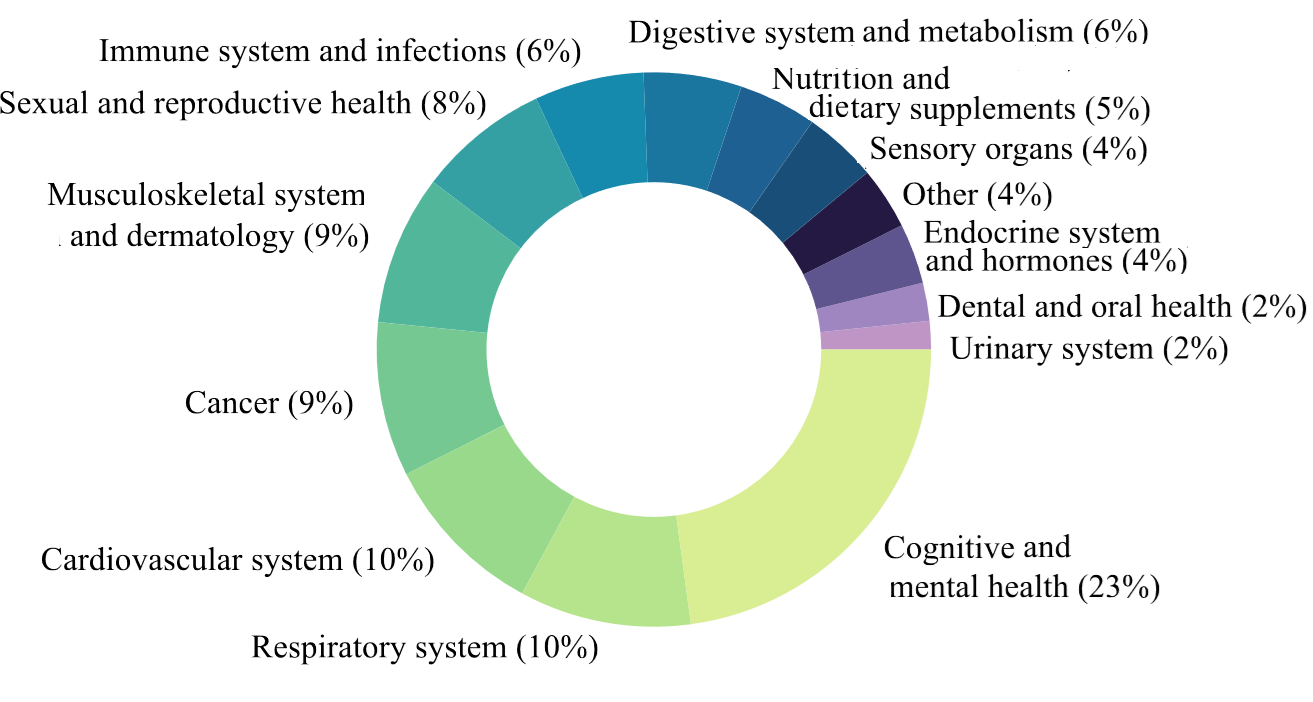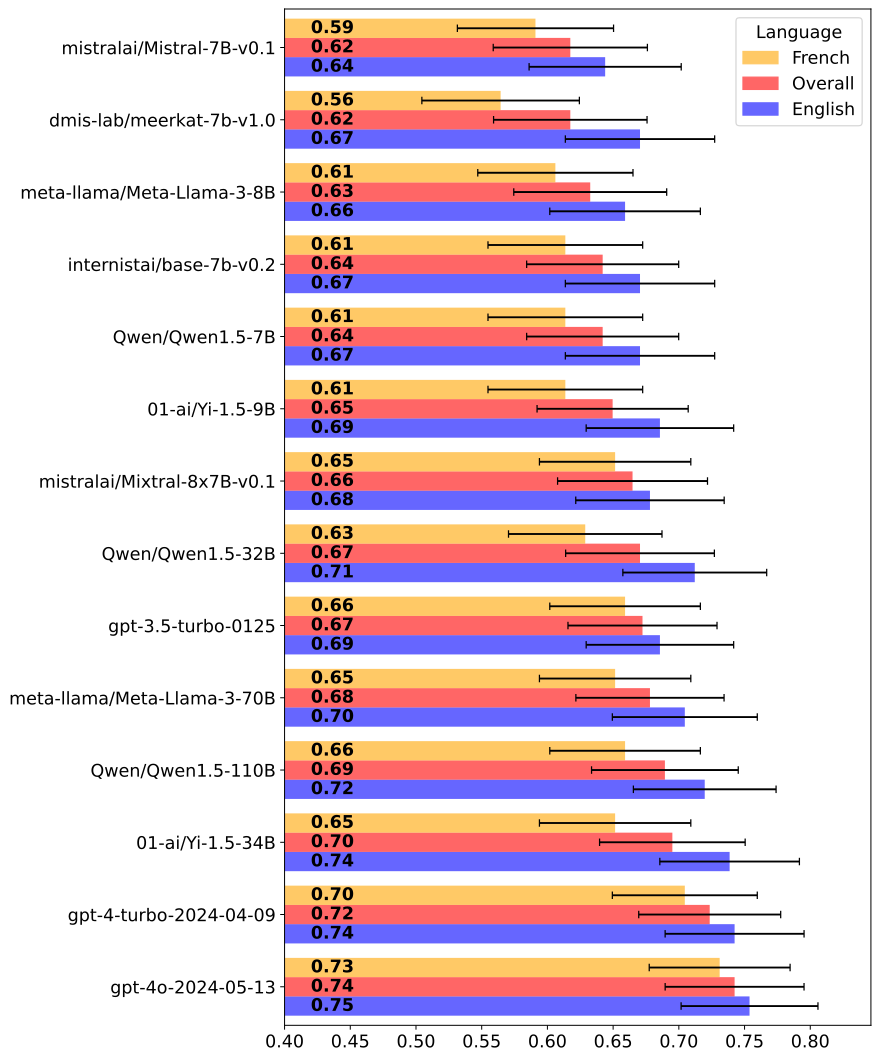MedREQAL: Examining Medical Knowledge Recall of Large Language Models via Question Answering
2406.05845

0
0

Abstract
In recent years, Large Language Models (LLMs) have demonstrated an impressive ability to encode knowledge during pre-training on large text corpora. They can leverage this knowledge for downstream tasks like question answering (QA), even in complex areas involving health topics. Considering their high potential for facilitating clinical work in the future, understanding the quality of encoded medical knowledge and its recall in LLMs is an important step forward. In this study, we examine the capability of LLMs to exhibit medical knowledge recall by constructing a novel dataset derived from systematic reviews -- studies synthesizing evidence-based answers for specific medical questions. Through experiments on the new MedREQAL dataset, comprising question-answer pairs extracted from rigorous systematic reviews, we assess six LLMs, such as GPT and Mixtral, analyzing their classification and generation performance. Our experimental insights into LLM performance on the novel biomedical QA dataset reveal the still challenging nature of this task.
Create account to get full access
Overview
- This paper, titled "MedREQAL: Examining Medical Knowledge Recall of Large Language Models via Question Answering", investigates the medical knowledge recall capabilities of large language models (LLMs) through a question-answering task.
- The researchers developed a new dataset, MedREQAL, which contains a diverse set of medical questions to assess the performance of LLMs in recalling and applying medical knowledge.
- The study compares the performance of various LLMs, including GPT-3, BERT, and T5, on the MedREQAL dataset, providing insights into the strengths and limitations of these models in the medical domain.
Plain English Explanation
The paper explores how well large language models, which are AI systems trained on vast amounts of text data, can recall and apply medical knowledge. The researchers created a new dataset called MedREQAL that contains a variety of medical questions, ranging from basic anatomy to treatment recommendations. They then tested different language models, such as GPT-3, BERT, and T5, on this dataset to see how accurately they could answer the medical questions.
The key idea is to understand the capabilities and limitations of these powerful language models when it comes to the specialized domain of healthcare and medicine. This is important because these models are increasingly being used in various medical applications, from clinical decision support to patient communication. By evaluating their performance on a diverse set of medical questions, the researchers can identify areas where the models excel and where they struggle, which can inform their future development and deployment in the medical field.
Technical Explanation
The paper presents the MedREQAL dataset, a new benchmark for evaluating the medical knowledge recall of large language models (LLMs). MedREQAL contains a diverse set of medical questions across various categories, including anatomy, physiology, pathology, diagnosis, and treatment. The researchers tested the performance of several prominent LLMs, such as GPT-3, BERT, and T5, on this dataset to assess their ability to recall and apply medical knowledge.
The experiments involved fine-tuning the LLMs on the MedREQAL dataset and evaluating their performance on a held-out test set. The researchers used metrics such as accuracy, F1 score, and perplexity to measure the models' performance. They also conducted qualitative analysis to understand the strengths and limitations of the models in different medical knowledge domains.
The results showed that the LLMs exhibited varying levels of performance on the MedREQAL dataset, with some models performing better than others on specific medical knowledge categories. The researchers also identified areas where the models struggled, such as recalling rare medical conditions or providing comprehensive treatment recommendations. These findings provide valuable insights into the capabilities and limitations of LLMs in the medical domain, which can inform their future development and deployment in healthcare applications.
Critical Analysis
The paper provides a comprehensive evaluation of the medical knowledge recall capabilities of large language models, which is a crucial step in understanding their potential and limitations in the healthcare domain. The MedREQAL dataset, developed by the researchers, is a valuable contribution to the field as it offers a standardized benchmark for assessing the medical knowledge of AI systems.
One potential limitation of the study is that it only evaluates the performance of the language models on a question-answering task, which may not fully capture their ability to handle more complex medical scenarios, such as clinical decision-making or medical reasoning. Additionally, the study does not delve into the interpretability and explainability of the models' outputs, which could be an important consideration for their use in medical applications.
Further research could explore the performance of LLMs on more diverse and challenging medical tasks, such as generating medical reports, summarizing patient records, or providing personalized treatment recommendations. Additionally, investigating the model's reasoning processes and the factors that contribute to their performance could lead to valuable insights for improving their medical knowledge and decision-making capabilities.
Conclusion
The MedREQAL paper provides a detailed examination of the medical knowledge recall capabilities of large language models, a crucial step in understanding their potential and limitations in healthcare applications. By creating a comprehensive benchmark dataset and evaluating the performance of various LLMs, the researchers have shed light on the strengths and weaknesses of these models in the medical domain.
The findings of this study have important implications for the development and deployment of LLMs in medical settings. The insights gained can inform the design of more robust and specialized models for healthcare, as well as guide the development of explainable AI systems that can provide transparent and trustworthy medical recommendations. As large language models continue to advance, studies like MedREQAL will play a crucial role in ensuring their safe and effective integration into the healthcare ecosystem.
This summary was produced with help from an AI and may contain inaccuracies - check out the links to read the original source documents!
Related Papers
💬
M-QALM: A Benchmark to Assess Clinical Reading Comprehension and Knowledge Recall in Large Language Models via Question Answering
Anand Subramanian, Viktor Schlegel, Abhinav Ramesh Kashyap, Thanh-Tung Nguyen, Vijay Prakash Dwivedi, Stefan Winkler

0
0
There is vivid research on adapting Large Language Models (LLMs) to perform a variety of tasks in high-stakes domains such as healthcare. Despite their popularity, there is a lack of understanding of the extent and contributing factors that allow LLMs to recall relevant knowledge and combine it with presented information in the clinical and biomedical domain: a fundamental pre-requisite for success on down-stream tasks. Addressing this gap, we use Multiple Choice and Abstractive Question Answering to conduct a large-scale empirical study on 22 datasets in three generalist and three specialist biomedical sub-domains. Our multifaceted analysis of the performance of 15 LLMs, further broken down by sub-domain, source of knowledge and model architecture, uncovers success factors such as instruction tuning that lead to improved recall and comprehension. We further show that while recently proposed domain-adapted models may lack adequate knowledge, directly fine-tuning on our collected medical knowledge datasets shows encouraging results, even generalising to unseen specialist sub-domains. We complement the quantitative results with a skill-oriented manual error analysis, which reveals a significant gap between the models' capabilities to simply recall necessary knowledge and to integrate it with the presented context. To foster research and collaboration in this field we share M-QALM, our resources, standardised methodology, and evaluation results, with the research community to facilitate further advancements in clinical knowledge representation learning within language models.
6/7/2024

MedExpQA: Multilingual Benchmarking of Large Language Models for Medical Question Answering
I~nigo Alonso, Maite Oronoz, Rodrigo Agerri

0
0
Large Language Models (LLMs) have the potential of facilitating the development of Artificial Intelligence technology to assist medical experts for interactive decision support, which has been demonstrated by their competitive performances in Medical QA. However, while impressive, the required quality bar for medical applications remains far from being achieved. Currently, LLMs remain challenged by outdated knowledge and by their tendency to generate hallucinated content. Furthermore, most benchmarks to assess medical knowledge lack reference gold explanations which means that it is not possible to evaluate the reasoning of LLMs predictions. Finally, the situation is particularly grim if we consider benchmarking LLMs for languages other than English which remains, as far as we know, a totally neglected topic. In order to address these shortcomings, in this paper we present MedExpQA, the first multilingual benchmark based on medical exams to evaluate LLMs in Medical Question Answering. To the best of our knowledge, MedExpQA includes for the first time reference gold explanations written by medical doctors which can be leveraged to establish various gold-based upper-bounds for comparison with LLMs performance. Comprehensive multilingual experimentation using both the gold reference explanations and Retrieval Augmented Generation (RAG) approaches show that performance of LLMs still has large room for improvement, especially for languages other than English. Furthermore, and despite using state-of-the-art RAG methods, our results also demonstrate the difficulty of obtaining and integrating readily available medical knowledge that may positively impact results on downstream evaluations for Medical Question Answering. So far the benchmark is available in four languages, but we hope that this work may encourage further development to other languages.
4/9/2024

A Survey on Large Language Models from General Purpose to Medical Applications: Datasets, Methodologies, and Evaluations
Jinqiang Wang, Huansheng Ning, Yi Peng, Qikai Wei, Daniel Tesfai, Wenwei Mao, Tao Zhu, Runhe Huang

0
0
Large Language Models (LLMs) have demonstrated surprising performance across various natural language processing tasks. Recently, medical LLMs enhanced with domain-specific knowledge have exhibited excellent capabilities in medical consultation and diagnosis. These models can smoothly simulate doctor-patient dialogues and provide professional medical advice. Most medical LLMs are developed through continued training of open-source general LLMs, which require significantly fewer computational resources than training LLMs from scratch. Additionally, this approach offers better protection of patient privacy compared to API-based solutions. This survey systematically explores how to train medical LLMs based on general LLMs. It covers: (a) how to acquire training corpus and construct customized medical training sets, (b) how to choose a appropriate training paradigm, (c) how to choose a suitable evaluation benchmark, and (d) existing challenges and promising future research directions are discussed. This survey can provide guidance for the development of LLMs focused on various medical applications, such as medical education, diagnostic planning, and clinical assistants.
6/18/2024

Multiple Choice Questions and Large Languages Models: A Case Study with Fictional Medical Data
Maxime Griot, Jean Vanderdonckt, Demet Yuksel, Coralie Hemptinne

0
0
Large Language Models (LLMs) like ChatGPT demonstrate significant potential in the medical field, often evaluated using multiple-choice questions (MCQs) similar to those found on the USMLE. Despite their prevalence in medical education, MCQs have limitations that might be exacerbated when assessing LLMs. To evaluate the effectiveness of MCQs in assessing the performance of LLMs, we developed a fictional medical benchmark focused on a non-existent gland, the Glianorex. This approach allowed us to isolate the knowledge of the LLM from its test-taking abilities. We used GPT-4 to generate a comprehensive textbook on the Glianorex in both English and French and developed corresponding multiple-choice questions in both languages. We evaluated various open-source, proprietary, and domain-specific LLMs using these questions in a zero-shot setting. The models achieved average scores around 67%, with minor performance differences between larger and smaller models. Performance was slightly higher in English than in French. Fine-tuned medical models showed some improvement over their base versions in English but not in French. The uniformly high performance across models suggests that traditional MCQ-based benchmarks may not accurately measure LLMs' clinical knowledge and reasoning abilities, instead highlighting their pattern recognition skills. This study underscores the need for more robust evaluation methods to better assess the true capabilities of LLMs in medical contexts.
6/5/2024